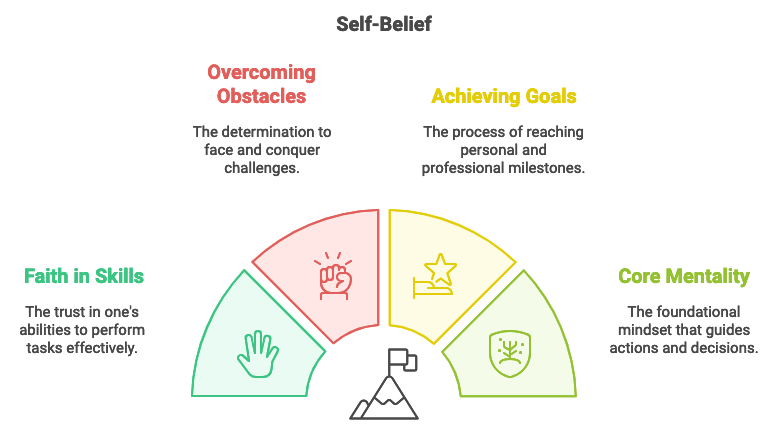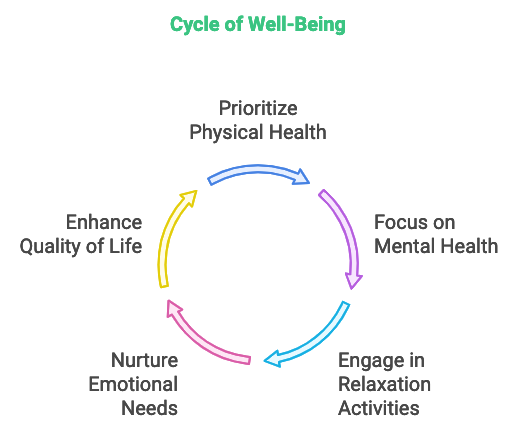Introduction
Discovering Your Full Potential
Believing in yourself is a powerful philosophy that can change your life, not simply a slogan for motivation. It serves as the cornerstone around which goals and dreams are constructed. However, what does it really mean to have self-belief, and how can one develop this belief? Let’s explore this powerful idea in more detail.”Believe in yourself” is a common refrain in self-help books, motivational speeches, and numerous conversations in a world full of obstacles and uncertainty. However, what does it actually mean to have self-confidence, and how can it affect your life? Let’s examine the fundamentals of self-belief and how it might impact your journey in a revolutionary way.
Recognizing Your Own Belief
Fundamentally, self-belief is having faith in your skills, judgment, and potential. It all comes down to having faith that, despite how impossible things may seem, you can overcome obstacles and accomplish your objectives. Being self-assured is more than simply a platitude; it’s a core mentality that directs our behaviour.Self-belief alone can be your greatest strength in a world full with obstacles, diversions, and self-doubt. Self-belief is the cornerstone of success in the emotional, professional, and personal spheres of life; it is not merely a motivational catchphrase. It influences how we view possibilities, deal with difficulties, and eventually develop. This post will discuss the importance of believing in oneself, the obstacles that frequently stand in our way, and useful techniques for boosting and preserving self-confidence.
Why is Self-Belief So Important?
Fundamentally, self-belief is the conviction that you can accomplish your objectives and deal with life’s uncertainties. Your chances of success are much increased when you approach things with a positive mindset, which comes from believing in yourself. This idea encourages tenacity, inventiveness, and fortitude.
On the other hand, a lack of self-belief can lead to self-sabotage, wasted chances, and fear of failing. Imagine not being confident in your abilities when you go into a job interview. This uncertainty can impair your capacity to speak clearly, which will reduce your chances of success even if you are qualified.

The Influence of a Positive Attitude
Positivity is directly associated with self-belief. According to studies, those who have a high level of self-efficacy—belief in one’s own abilities—are more inclined to take on obstacles head-on and grow from mistakes. They frequently push themselves to reach their objectives, venture beyond of their comfort zones, and take greater chances.
Thinking positively alters our approach to life’s obstacles. It enables us to view setbacks as teaching opportunities rather than as indications of personal failure. This mentality adjustment has the power to significantly alter your course, eventually resulting in development and success.
The Obstacles to Belief in Oneself
Although having confidence in oneself is very empowering, it’s not always simple. Many of us battle uncertainty, fears, and other influences that might undermine our self-esteem. Building enduring self-belief requires recognising and removing these obstacles.
Fear of Failure
One of the main barriers to self-belief is fear. Because they fear failing or making mistakes, many people are reluctant to act. This dread is frequently a result of past bad experiences or cultural expectations. We must alter our perspective on mistakes if we are to overcome our fear of failing. Failure should be viewed as a springboard for growth rather than as the end.
Negative Self-Talk
We all have internal conversations, and regrettably, many of them are filled with criticism of themselves. Your confidence and belief in your skills might be undermined by negative self-talk. We frequently tell ourselves things like “I’m not good enough” or “I’ll never be successful,” frequently without realising the harm they do.
External Verification
A lot of people depend their sense of value on what other people think of them. Although receiving praise from mentors or peers can feel wonderful at the time, it can also lead to dependency. Genuine self-belief originates internally rather than through external validation. Maintaining self-confidence requires learning to keep your value apart from opinions from others.
How to Build and Strengthen Your Self-Belief
The good news is that self-belief is something you can develop if you’ve ever had trouble believing in yourself. It can be developed gradually with practice and persistence, just like any other ability. These practical techniques will help you begin to believe in yourself more.
Make Achievable Objectives
The best strategy to develop self-belief is to set and accomplish modest, achievable goals. Your confidence is bolstered when you complete even small tasks. These little victories add up over time, increasing your sense of competence and self-assurance.
For instance, divide the process of learning a new skill into smaller, more achievable segments. Honour every accomplishment, no matter how minor. This increases your energy and enhances your belief that you can accomplish more ambitious objectives.
Challenge Negative Thoughts
Your confidence might be weakened at any time by negative thoughts. The important thing is to confront these thoughts rather than run away from them. Ask yourself, “Is this really true?” whenever you find yourself thinking, “I’m not good enough.” Negative thoughts frequently lack proof and are illogical.
Positive affirmations can also have a significant impact when used to replace negative self-talk. Try reminding yourself, “I have the skills to succeed,” or “I can handle this.” These affirmations will gradually assist you in changing your perspective from one of uncertainty to one of confidence.
Surround Yourself with Positivity
Your self-belief is greatly influenced by the individuals you choose to surround yourself with. It can be difficult to keep your confidence if you’re surrounded by people who are always critical or unsupportive. Instead, look for people who inspire, motivate, and support your own development.
Growth is fostered by favourable surroundings. Having others who believe in you, whether they be a community, mentor, or supportive friend, can boost your self-esteem and motivate you to succeed.
Accept Failure as Studying
Although failure is unavoidable, you have power over how you handle it. Use failure as a teaching moment rather than allowing it to undermine your confidence. Examine what went wrong, modify your strategy, and apply the knowledge you’ve gained going ahead.
Adversity is the foundation of resilience, and every setback advances you towards achievement. Failures no longer feel intimidating or dangerous when you regard them as teaching opportunities, and your confidence is unaffected.
Take Care of Your Well-Being
Taking care of oneself is crucial to preserving self-belief. Neglecting your mental, emotional, or physical well-being might make it hard to have self-confidence. A balanced diet, regular exercise, and enough sleep all support mental and physical health, which in turn increases self-confidence.
Journaling and meditation are two mindfulness techniques that can help you focus on your potential and strengths while managing stress, worry, and negative thoughts.

Conclusion
Believing in yourself is the key to unlocking your full potential.It serves as the cornerstone around which all accomplishments are constructed. There are numerous obstacles that might erode self-belief, such as negative self-talk and fear of failing, but there are also innumerable ways to get past these obstacles. You can develop the self-confidence required to overcome obstacles in life and take advantage of opportunities by establishing attainable objectives, confronting negative ideas, surrounding yourself with positive people, accepting failure, and taking care of your health.
Keep in mind that self-belief is a journey rather than a destination. You can develop the inner confidence required to soar to new heights and realise your dreams with perseverance, practice, and patience. Have faith in yourself and see how your life changes.
FAQs.
What is meant by “believe in yourself”?
“Believing in yourself” refers to having faith in your own skills and knowing that you can overcome obstacles and achieve your objectives. It entails having an optimistic view of oneself, being resilient, and having the guts to take chances even when success is uncertain.
For what reason is self-belief important?
Self-belief is essential for overcoming obstacles, staying motivated, and enduring hardship. You’re more likely to set lofty objectives, work consistently, and overcome setbacks when you have confidence in yourself. Research indicates that having self-confidence improves mental health by lowering worry and encouraging optimism.
How can I develop my belief in myself?
Establish Small Goals: To build confidence through little victories, start with manageable chores.
Positive Self-Talk: Swap out pessimistic ideas for uplifting ones.
Learn from Failure: Rather than viewing losses as personal failings, view them as teaching moments.
Be in the company of supportive people: Mentors and friends who are upbeat and encouraging might help you believe in yourself.
Celebrate Your Success: Acknowledge and honour your accomplishments, no matter how modest.
Which exercises are useful for building self-confidence?
Visualisation: To cultivate an optimistic outlook, picture oneself succeeding.
Recite affirmations that reaffirm your strengths and sense of value.
Journaling: Every day or every week, consider your accomplishments and places for improvement.
Leaving Comfort Zones: To develop bravery and flexibility, try new things frequently.
To what extent does self-belief contribute to success?
Self-belief develops a growth attitude, resilience, and motivation—all of which are essential for success. Your chances of achieving your objectives are increased when you have confidence in your skills because you are more willing to work hard, take calculated risks, and adjust to obstacles.
Believing in yourself is a journey, and building this confidence takes time, practice, and patience. For more in-depth resources, you might explore personal development articles on sites like.

